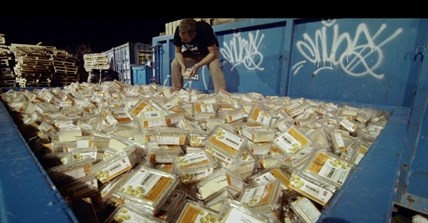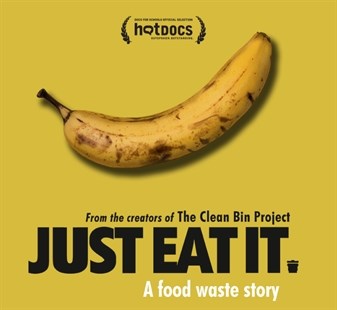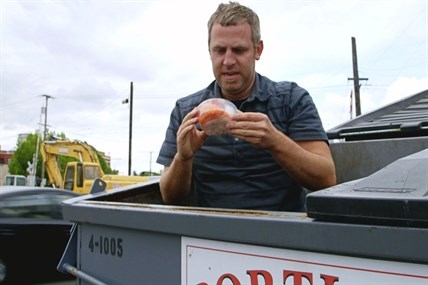
A screen shot from the trailer for the documentary Just Eat It: A Food Waste Story.
Image Credit: YouTube
April 26, 2014 - 4:29 PM
TORONTO -- After learning that about 40 per cent of food is thrown away annually in developed countries, Grant Baldwin and Jenny Rustemeyer embarked on an experiment. The filmmakers pledged to quit grocery shopping and survive on discarded food for six months.
The results are chronicled in their film "Just Eat It: A Food Waste Story," which premieres Sunday at Toronto's Hot Docs festival.
The couple discovered studies showing about half of the food waste in Canada is generated in the home and each Canadian family throws out more than $1,000 worth of food in a year.
When food is wasted, the agricultural resources used to produce the food, such as water and soil, are lost as well.
Originally Rustemeyer was reluctant to embark on the project but then agreed to a trial of 30 days, though she balked at dumpster diving. Baldwin became the forager. Once the couple realized they could eat well on the food they were rescuing, they extended the trial to six months.
"When we described this to our friends and family before we started, guaranteed they were thinking that we were going to go behind restaurants and eat scraps off people's plates, disgusting, dirty food," Baldwin said in Toronto ahead of the screening.
"And as we sort of moved through the project they started to realize -- because they could see what we were bringing to barbecues and occasions like that -- like, 'whoa, chocolate, can I have some?' 'Yeah, like here's a whole case.' So they really realized there's food that's not making it to the grocery store that's getting thrown away, like surplus food. Stores are like, 'I can't sell all that in that time, so just get rid of it."'

Image Credit: Contributed
The Vancouver couple found cases of good-quality chocolate they figured were discarded because the labelling did not include French, mandatory in Canada, and a swimming pool-sized dumpster of containers of hummus that was perfectly edible. Cartons of eggs gleaned from a wholesaler and one-litre containers of yogurt filled the fridge.
Another time they found a pallet one metre square containing hundreds of jars of pickled herring from Europe that Baldwin speculated would sell for $7 a jar in a gourmet food store.
"There was nothing wrong with it. It was too close dated for their comfort level."
In the first month they logged $1,127 worth of food that was brought home, but despite their best efforts they paid only $33. By the end of six months, they calculated they spent less than $200 on groceries and rescued more than $20,000 worth of food.
Baldwin, the film's director and editor, said they attempted many times to pay for food at grocery stores before it hit the dumpster "and 90 per cent of the time they'd say, 'We can't help you because we're not allowed to sell stuff to you. We have a quality standard.' Or they would say, 'We can't because it's not up to health standards to be able to sell you that stuff,' which is actually not true at all. In Canada you can actually sell food past the date label. It's legal."

Grant Baldwin, pictured, Jenny Rustemeyer, pictured, and her husband Grant Baldwin of Vancouver lived out of dumpsters for 6 months.
Image Credit: Contributed
Sell-by or best-before dates are found on most products but are not an indication of safety but rather help with rotating stock. The date also indicates a time of peak freshness. "After that it has nothing to do with that it's unsafe. It's just not maybe the crispiest potato chip."
Expiry dates, on the other hand, are on a handful of products, such as baby formula and nutritional supplements, because if they're eaten past the date they're not providing the optimal nutrition.
"There's no regulation that prevents them from selling it after the best-before date because there is no safety concern with that product," Daniel Miller, executive director of food labelling for the Canada Food Inspection Agency, says in the film.
Touches of humour and upbeat music break up the thought-provoking information relayed by experts such as Dana Gunders, author of "Wasted: How America is Losing Up to 40 Per Cent of Its Food from Farm to Fork to Landfill," Jonathan Bloom, journalist and author of "American Wasteland," and Tristram Stuart, activist and author of "Waste: Uncovering the Global Food Scandal."

Jenny Rustemeyer, pictured, and her husband Grant Baldwin of Vancouver lived out of dumpsters for 6 months.
Image Credit: Contributed
Baldwin and producer Rustemeyer -- whose first film was 2010's award-winning "The Clean Bin Project," in which they spent a year trying not to produce any garbage -- also point to portion sizes, noting that recipes in the venerable "Joy of Cooking" might have stated a yield of six to eight servings decades ago, but now the same recipe says it will make two to four servings.
Baldwin actually gained 10 pounds after four months of the experiment, to which he attributes eating processed food and stuffing himself to try to use up the copious amounts of food they'd found so as not to waste it again.
There was definitely no shortage of food. "It was stored under the bed, in the bathroom closet, cupboards were full, fridge was full, like 30 one-litre yogurts. The problem became too much food and it was nothing to do with scrounging at all any more."
The filmmakers provide tips for reducing waste, such as freezing food so it doesn't go bad. Before shopping, check the pantry and fridge to see what needs to be used up, make a list and stick to it. Place items to be used up in an "Eat Me First" bin in the fridge.
With the end of their experiment, Baldwin has given up dumpster diving -- for the most part.
"I have to be honest -- I've taken a look from time to time."
"Just Eat It" screens Sunday and Tuesday at the Hot Docs festival in Toronto.
News from © The Canadian Press, 2014